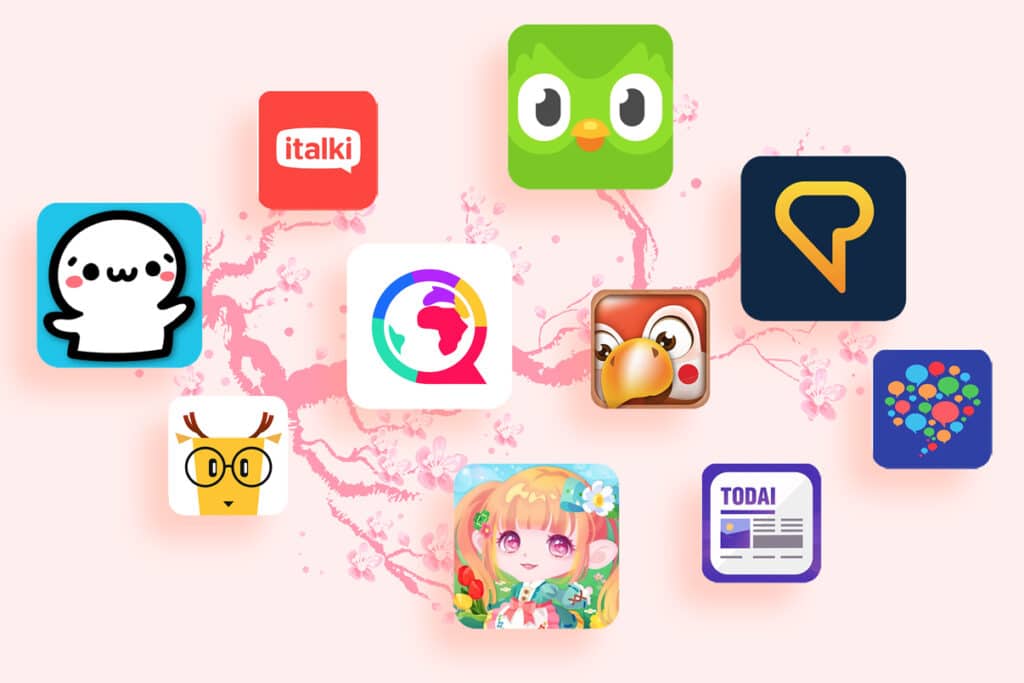
6 Best Apps to Learn Japanese and Advance Your Language Skills in 2024
For this post, I sifted through app stores and websites to find the best apps for learning Japanese.
I tested dozens of apps to see which were the most relevant and had the highest-quality learning materials.
Below are six of my absolute favorite Japanese learning apps that will allow you to swipe and tap your way to greater Japanese fluency.
Of course, the best app to learn Japanese for you may depend on your circumstances—so I’ve labeled each entry and included a shortlist of honorable mentions for specific language skills, too, so everyone can find what works best for them.
Contents
- 1. Best for Short Lessons: Busuu
- 2. Best for Immersive Learning: FluentU
- 3. Best for Structured Courses: LingoDeer
- 4. Best for Audio-based Lessons: Pimsleur
- 5. Best for Long-term Learning: Rocket Languages
- 6. Best Gamified App: Duolingo
- Honorable Mentions: Japanese Apps for Specific Skills
- How to Choose the Best App to Learn Japanese for You
Download: This blog post is available as a convenient and portable PDF that you can take anywhere. Click here to get a copy. (Download)
1. Best for Short Lessons: Busuu
Price: Free; subscriptions available
Busuu is an all-around Japanese learning app with quick, daily lessons that emphasize speaking.
This app aims to teach you Japanese in just 10 minutes per day, so it’s easy to use if you’re crunched for time. It emphasizes vocabulary and even has a section dedicated to travel phrases.
Aside from vocab, it also teaches grammar, pronunciation, writing, reading and conversation skills. The app even helps you create a personalized study plan so you can maximize your study time.
With Busuu, you can easily track how much progress you’ve made. The program is best suited for beginner and intermediate learners.
See our full review of Busuu here.
2. Best for Immersive Learning: FluentU
Price: Subscription-based; free trial available
FluentU offers authentic Japanese videos like movie clips and inspirational talks with interactive captions in English and Japanese:
You’ll be able to take a quiz after each video with speaking and listening exercises included, and you can create personalized flashcards for any new words you come across.
Rather than showing you only the definition of a word, FluentU’s multimedia dictionary will show you the word’s meaning in context, with sentence examples. You can even find other videos that use that word for additional practice.
Full transcripts with audio and definitions at a hover accompany each video, as well as a word bank of key terms used in the clip.
3. Best for Structured Courses: LingoDeer
Price: Free; subscriptions available
This beginner- to intermediate-level resource teaches the Japanese language and grammar in a step-by-step manner that continuously builds on what you already know.
LingoDeer’s Japanese courses are carefully structured to offer vocabulary lessons, detailed explanations on grammar points and contextual dialogues.
You move through lessons compiled into units, though the app also has other learning options like flashcards, stories, phrasebooks and more.
The structured format of LingoDeer can take you from knowing nothing about Japanese to being able to form your own sentences at an intermediate level.
See our full review of LingoDeer here.
4. Best for Audio-based Lessons: Pimsleur
Price: Subscription-based; free trial available
Pimsleur’s teaching approach centers on audio-based lessons, leveraging spaced repetition to reinforce vocabulary, pronunciation and conversational skills.
Lessons immerse learners in real-life scenarios, encouraging active participation by prompting users to listen, repeat and engage in interactive conversations.
Pimsleur’s portability allows for on-the-go learning, making it ideal for people with busy schedules or those who prefer auditory learning methods.
The app’s structured lessons gradually build language skills, so it’s suitable for beginners as well as students seeking to enhance their speaking abilities.
See our full review of Pimsleur here.
5. Best for Long-term Learning: Rocket Languages
Price: Subscription-based; free trial available
If you’re really serious about studying Japanese, Rocket Languages can help you from beginner to intermediate to advanced levels.
The holistic learning experience covers vocabulary, grammar, speaking, writing and listening skills. Its interactive lessons are designed to fit into your schedule, allowing flexible learning at your own pace.
The app’s strength lies in its diverse array of learning tools, including interactive audio lessons, language and culture lessons, quizzes, and progress tracking features.
Rocket Languages offers an unlimited free trial, meaning you’ll get access to a small part of the Japanese course forever. If you decide to purchase the whole course, you get lifetime access.
See our full review of Rocket Languages here.
6. Best Gamified App: Duolingo
Price: Free; subscriptions available
Who hasn’t heard of this popular language learning app? It’s well-known for a reason!
Duolingo uses game-like features and fun challenges to encourage you to study and keep you motivated.
The quick and immersive Japanese lessons are based on pictures and intuitive learning. The app also provides quizzes to help you remember vocabulary and kanji.
Lessons are short and light, so you can study Japanese whenever you have a few free minutes throughout the day.
See our full review of Duolingo here.
Honorable Mentions: Japanese Apps for Specific Skills
Above are the best apps for learning all the Japanese language skills. If you’re looking to improve a certain area of your Japanese, however, one of these apps might suit your specific needs:
- Best for Grammar Lessons: Bunpo (iOS/Android). This app covers all of the grammar points in the JLPT. It also includes a complete Japanese grammar dictionary and over 8,000 quiz questions.
- Best for Building Vocabulary: Drops (iOS/Android). For five minutes a day, Drops immerses you in Japanese as you swipe and tap to match images to words. See our Drops review here for more information.
- Best for Effective Studying: Anki (iOS/Android). A classic flashcard app that uses spaced repetition for efficient studying. You can see community-created Japanese decks here, and more information about studying with Anki here.
- Best for Practice with Natives: HelloTalk (iOS/Android). HelloTalk is a language exchange app that connects you with native Japanese speakers. Your language partner can edit your texts to correct your grammar, and you can even share voice messages! See our HelloTalk review here for more information.
- Best for Kanji: Japanese Kanji Tree Pro (Android). Though only available for Android users, this app helps with kanji recognition, reading and writing. You can learn based on JLPT or grade level and, with an upgrade to Pro, you can create your own learning lists.
How to Choose the Best App to Learn Japanese for You
Looking at this list might be a little overwhelming. There are so many great apps to choose from. But how do you know the best one(s) for you?
There are a few things to take into account when choosing a Japanese learning app:
- Your Japanese level. If you’re a beginner, you might want to focus on apps designed specifically for new learners. If you’re more advanced, you can select an app that will support that—or even one that focuses on something you want to improve upon.
- The time commitment. Some apps work best if you log in every day to refresh your memory or earn rewards. But if you’re trying to learn while working full-time, or have major family commitments, try using apps that allow you to pop in and learn a little whenever you can.
- Specific Japanese skills. Have you signed up for the Japanese Language Proficiency Test and need to target skills like kanji or grammar? Or do you want to improve your listening comprehension? If so, focus on apps that cater to a specific skill or teach a certain skill particularly well.
With these six apps for learning Japanese (plus the honorable mentions, of course), you can make the most of your downtime and tap your way to fluency!
Download: This blog post is available as a convenient and portable PDF that you can take anywhere. Click here to get a copy. (Download)








